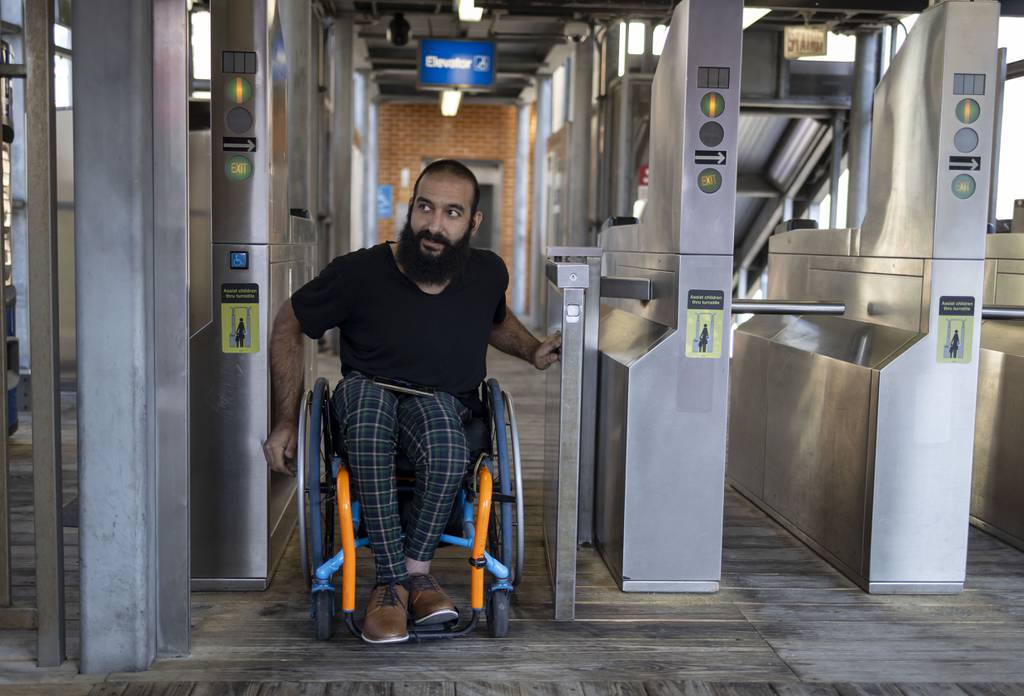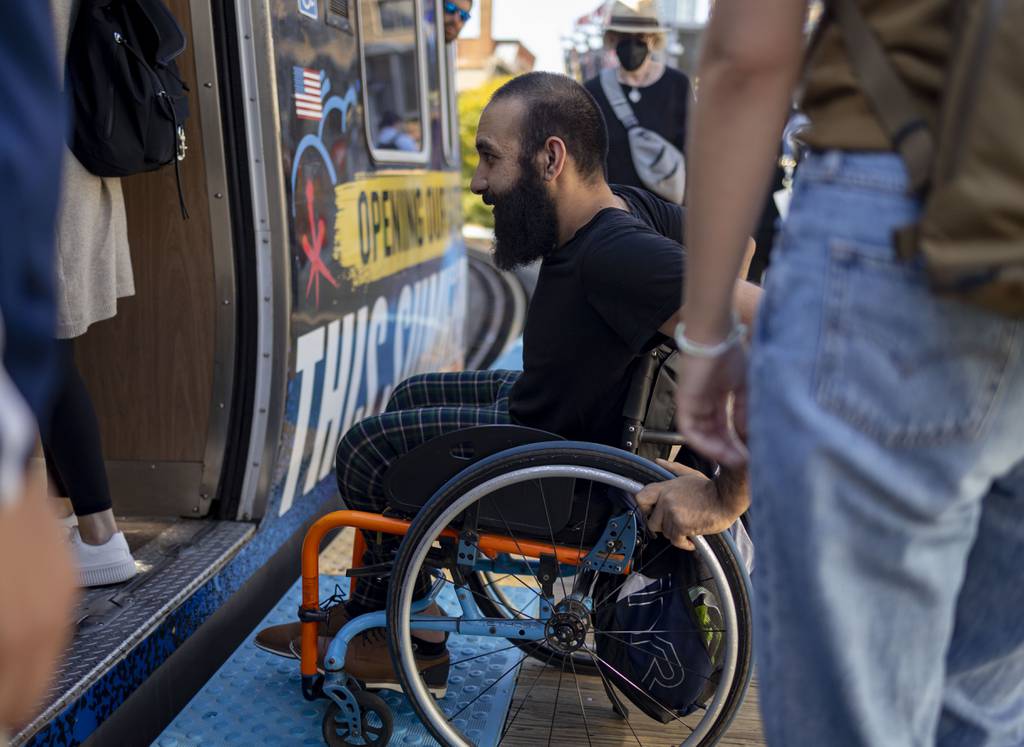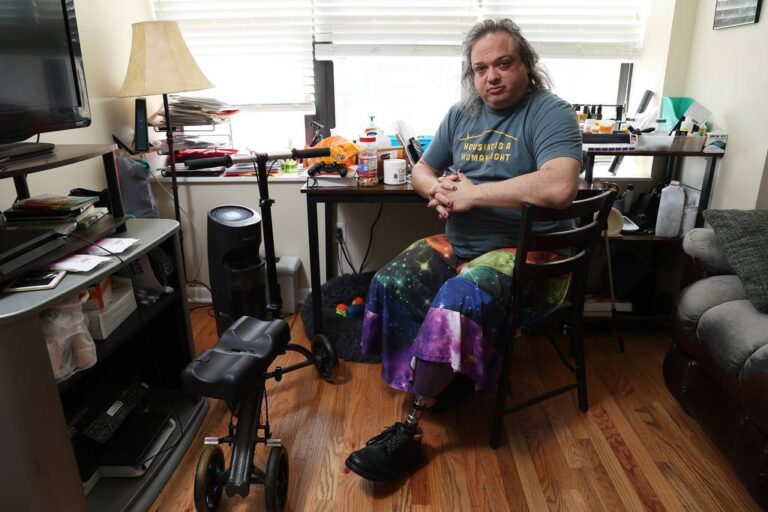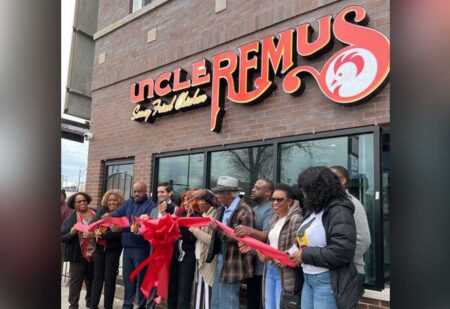Getting around Chicago has long been difficult for David Zoltan, but nonetheless he once would have jumped on a bus to get a bite to eat. He would take public transit to meet up with friends, and to doctors’ appointments in Streeterville.
Zoltan, 46, has spinal stenosis that causes severe back pain and one leg is amputated below the knee, and he qualified for a transit pass that allows him to ride CTA, Pace or Metra for free. But since the start of the pandemic he has rarely used it, limiting trips outside his Rogers Park apartment. When it was necessary to leave, he often turned instead to more private services like ride-share or programs that provide rides, unwilling to get back on public transit because people with disabilities remain at higher risk for COVID-19.
He didn’t renew his ride-free pass when it expired in 2022.
“Why would you renew a ride-free permit that you’re not using, especially when it’s so much trouble go to through?” he asked.
For years, eligible Chicago-area seniors and people with disabilities have been able to apply for permits to either ride transit for free or at reduced fares. But the number of free and reduced-fare transit passholders in the Chicago area dropped sharply in 2022, falling by about 23% from the prior year, according to Regional Transportation Authority data obtained by the Tribune.
The program’s application process has always been difficult for some to navigate, advocates said. But 2022 also marked the first year since the start of the COVID-19 pandemic that cardholders were asked to renew their passes. And many of the seniors and people with disabilities who once used the permits had either died or seemingly chose not to come back to transit, said Michael VanDekreke, director of mobility services for the RTA.
Though other transportation programs exist, like Americans with Disabilities Act paratransit, lower enrollment in the free/reduced fare program could contribute to continued social isolation for seniors and people with disabilities, said Adam Ballard with AARP Illinois. That can take a toll on their health.
“People with disabilities and lower-income, older adults, their care is paid for by taxpayer money one way or another,” he said. “So there is an actual bottom-line cost to people not having freedom of movement as well that I think people need to understand.”
A robust and accessible transportation system is also crucial to the city, Zoltan and others argue.
Recent legislation has sought to broaden who gets to ride public transit at a lower cost, and Zoltan advocated for recently approved changes to state law that will automatically renew ride-free permits for people currently eligible. Lawmakers said the changes could boost participation in the program.
More state funding could also help, VanDekreke said. The region’s public transit agencies are federally required to provide certain types of reduced fares to seniors and those with disabilities, and state funding covers about 20% of the cost of the program, he said. More money would allow the agency to hire additional staff for in-person outreach.
Public transit historically has been heavily reliant on fares to cover a significant portion of operating costs, and that, too, has limited the RTA’s ability to prioritize a program focused on low fares, VanDekreke said. Requirements that the region’s transit systems raise at least 50% of their revenue through money they generate themselves, primarily through fares, had been suspended during the COVID-19 pandemic, and RTA and other agencies are looking to new funding methods when federal pandemic relief aid runs out.
“We could do more, for sure, but when you’re looking at half of your fares come from the farebox recovery (requirement), it’s never risen to the top of something we can afford to do,” VanDekreke said.
State Sen. Ram Villivalam, a Chicago Democrat who chairs the Senate Transportation Committee, said he was open to discussion about a full reimbursement for the free and reduced fare program, but it would have to be paired with change.
“People need to be confident that their public transit is reliable, safe and will get them from point A to point B,” he said, referring to issues that have been key concerns for riders in recent years. “We need to accomplish that, and that’s going to take some innovation and some reforms.”
Last year, about 281,300 seniors and people with disabilities had permits to ride public transit for free or at a reduced cost, down from 363,600 in 2021, RTA data shows. Both figures were down significantly from more than 500,000 users in 2014 — the earliest year for which RTA provided data — but VanDekreke said that was largely due to a data cleanup five years ago when the agency switched program vendors and purged its database of duplicate customers and those who had died.
Though RTA suspects the pandemic is behind the 2022 drop, VanDekreke acknowledged that the program’s bureaucracy can be burdensome for applicants. He said a new online application and renewal option was intended to help improve access.
Ballard said even before the pandemic, applicants were often confused about which of the region’s transit agencies they needed to apply through, or whether to go through the program vendor, and that state agencies are also involved in the application process for ride-free permits.
“It was a very Byzantine-type bureaucracy to manage, to get the right card at the right time,” he said.
There’s also the exhaustion customers face of yet another application to fill out. People with disabilities encounter complicated applications for a variety of services and frequent denials, and might be hesitant to embark on filling out more paperwork, said Laura Saltzman, transportation policy analyst at the disability advocacy organization Access Living.
In one example, Saltzman’s colleague, Atta Zahedi, public relations coordinator for the agency, applied for the program only after Saltzman raised the topic several months ago. Zahedi, who uses a wheelchair and is now going through the application process, said it takes time to get the necessary doctors’ appointments and submit forms.

Still, the program can be a lifeline for residents. Laura Donaldson, who has cerebral palsy, said her transit pass was her most vital asset when she experienced homelessness several years ago. Donaldson, 55, now mostly uses ADA paratransit, a reservation-based ride service, or relies on her daughter for rides from her home near the Pilsen neighborhood, but her transit pass helped when she did not have a permanent home, she said.
Access to transit gave her a sense of stability when she lived at a shelter, she said. The ability to get out of the shelter and around the city provided mental relief from the realities of her living situation, and not having to pay the full transit fare allowed her to save money for other uses like clothing, medical supplies or personal care. The permit, and access to transit that it provided, gave her a measure of freedom as she cared for her daughter.
When it came time to renew the permit, finding information about the process was difficult, she said. Because she did not have a permanent home, she worried about gathering the personal information required.
“If we can make (the permits) easier to use, access, update in any way, shape, form or fashion, then we need to,” she said. “That would help us to be more self-sufficient, and to just be more human and take a break from existing as homeless.”
Now, under the legislation Zoltan advocated for, ride-free permits will automatically renew, once those eligible submit proof of residency and, when necessary, disability. It’s one of several measures that Zoltan is pushing for that he thinks will improve the lives of people with disabilities and reduce their administrative burdens.
Though he no longer takes public transit regularly, Zoltan said others might feel more comfortable returning to transit and he wants to ensure they continue to have access to buses and trains. The auto-renewal measure is part of a broader push he is undertaking to improve access to other types of transit as well, because relying on ride-shares or a paratransit taxi program — as he does when he needs to go out — can add up financially, especially for people like him who are on fixed incomes, he said.
He hopes the change at RTA will set a precedent for eliminating renewal paperwork for other services.
“(The renewal process) adds to the burden,” he said. “It adds to the mountains and mountains and mountains of paperwork that we go through as disabled folks who are just trying to get some equity and access to our community and to our government and to our lives.”
State Sen. Mike Simmons, a Chicago Democrat who sponsored the auto-renewal legislation, said it seemed disrespectful to make people certify, year after year, that they have a disability, and seniors shouldn’t have to keep proving they’re seniors.
“That’s ridiculous,” he said.

Efforts are underway to expand who gets to ride free, and recommendations might be forthcoming to boost funding for current reduced-fare and free-ride programs. A measure signed into law by Gov. J.B. Pritzker in July calls for reduced fares for young people participating in employment and internship programs, and for preloaded transit cards to be provided by domestic violence and sexual assault service providers.
Villivalam said the efforts, along with another bill that requires certain employers to offer a pretax transit benefit, are intended to eliminate barriers to transit and boost ridership. That, in turn, could help restore confidence in public transit, which could also encourage those who use the free and reduced fare program to get back on buses and trains, he said.
The Chicago Metropolitan Agency for Planning, too, is considering the creation of new subsidies for low-income riders and other fare measures, as the agency works with community leaders to draft recommendations about what the future of transit should look like. The agency was tasked with creating recommendations as the region’s transportation agencies face a $730 million budget hole once federal COVID-19 relief funding runs out in the coming years.
CMAP is eyeing fare increases paired with the new subsidies and other measures in an effort to keep fares affordable. The organization is also considering calling for more state funding for the existing free and reduced fare program for seniors and people with disabilities.
VanDekreke said the RTA wants to provide the free and reduced fare service, and hopes to grow the program if it has the funding to do so.
“The people who are in these programs are the people who are typically transit dependent, and they’re the backbone of our system, along with essential workers,” he said.







